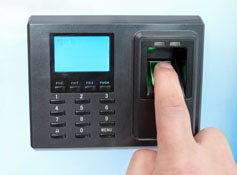
Employers are being advised not to follow the path of a Toronto law firm that will soon have some employees clocking in and out of the office by scanning their fingerprints.
“I certainly would advise employers against this course of action,” says David Doorey, a labour and employment law professor at Osgoode Hall Law School.
McCague Borlack LLP, a mid-size insurance boutique law firm, is planning to implement a new security system in a couple of weeks to track its administrative staff’s comings and goings.
It’s alleged that only secretaries and copy-room staff will be subject to the new rules and that it will not apply to lawyers, management, paralegals or law clerks.
The firm’s founding partner Howard Borlack told the
Toronto Star that this new system is meant to improve building security and crack down on those who were “abusing the system.”
“We had people taking two to three hours for lunch and we had no way of knowing,” he said.
Apparently some people at the firm had complained about staff who were working less than 40 hours a week.
But the secretaries are not happy about this new policy. They’ve started a blog called
“Which Finger to Give to Bay Street,” where they claim the fingerprinting system is not for security reasons at all, but that the firm seeks “greater control and ‘productivity enhancement.’”
They call this new system “inhumane monitoring.”
“The situation raises interesting and uncertain legal questions,” says Doorey.
“This is an emerging and still fluid area of employment law. Right now, we have no statute directly regulating fingerprinting in private-sector workplaces in Ontario. But the courts have been filling that void with their own common law rules,” he tells Legal Feeds.
Doorey refers to a new contractual obligation on employers to treat employees with dignity and decency, and the Ontario Court of Appeal’s ruling in January on the tort of
“intrusion upon seclusion.”“It’s not a stretch to suggest that forced fingerprinting of employees would be caught by either or both of those legal rules,” he says.
In terms of whether the fingerprinting system presents any privacy issues, Doorey says it’s more of a moral question since there is no privacy legislation in Ontario
per se.
However, “there are far less intrusive ways to monitor employees than forcing them to subject their bodies to scanning technology,” he says.

 Employers are being advised not to follow the path of a Toronto law firm that will soon have some employees clocking in and out of the office by scanning their fingerprints.
Employers are being advised not to follow the path of a Toronto law firm that will soon have some employees clocking in and out of the office by scanning their fingerprints.